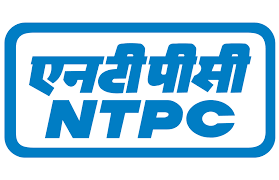MoS (Panchayati Raj) Shri Kapil Moreshwar Patil inaugurates the two-day National Workshop on Project Driven Block Panchayat Development Plan and District Panchayat Development Plan
Posted On: 05 JAN 2023 , Delhi
The Ministry of Panchayati Raj, Government of India is organizing a two-day National Workshop on Project Driven Block Panchayat Development Plan (BPDP) and District Panchayat Development Plan (DPDP) during 5 – 6 January, 2023 in New Delhi. The National Workshop aims on adopting, conceptualizing and popularizing Project Driven Block Panchayat Development Plan and District Panchayat Development Plan to projectize the process and implementation of Panchayat Development Plans.
The workshop was inaugurated by Shri Kapil Moreshwar Patil, Union Minister of State for Panchayati Raj in the presence of Shri Sunil Kumar, Secretary, Ministry of Panchayati Raj, Dr. S. M. Vijayanand, Former Secretary, MoPR, Dr. Bala Prasad, Former Special Secretary, MoPR and Shri Alok Prem Nagar, Joint Secretary, Ministry of Panchayat Raj. More than 650 delegates including elected representatives and functionaries of District Panchayats and Block Panchayats from across the country and representatives of various line Ministries/ Departments and different organisations/ institutions such as NABARD, IRMA, UNICEF etc. are attending the two-day workshop.
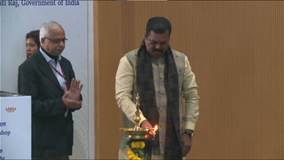
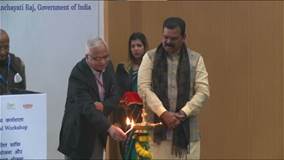
Shri Kapil Moreshwar Patil extended best wishes to the participants while addressing the two-day National Workshop and said that the National Workshop is being organized at an appropriate time – at dawn of the New Year – initiate planning process for all-round development of rural areas taking everyone along in the spirit of Sabka Saath–Sabka Vikas, Sabka Vishwas–Sabka Prayas. It should be our collective resolution to contribute to the nation building and development by working at the District, Block and Gram Panchayat level.
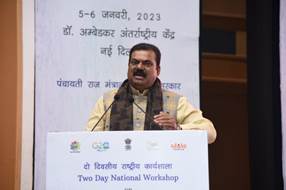
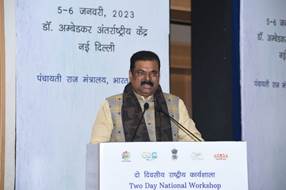
Shri Kapil Moreshwar Patil called for concerted efforts by all stakeholders to localize and realize the Sustainable Development Goals in rural areas through Panchayati Raj Institutions in a well-coordinated manner. The three-tier Panchayats should accord highest priority for the development of villages and rural areas by creating all the basic amenities and providing all the facilities / opportunities available in urban cities for bridging the urban–rural divide.
Technical Session on Project-Driven BPDP and DPDP was chaired by Shri Sunil Kumar, Secretary, Ministry of Panchayati Raj. He underlined that the resources being made available to the Panchayati Raj Institutions by the Central Government are continuously improving and the grants for Rural Local Bodies included the Block and District Panchayats as per recommendations of the Fifteenth Finance Commission. He added that Block Panchayats and District Panchayats should ensure effective implementation of development works and projects through better-quality Panchayat Development Plans with proper convergence and utilization of funds/ grants received from the Central and State Finance Commissions as well as other financial resources.
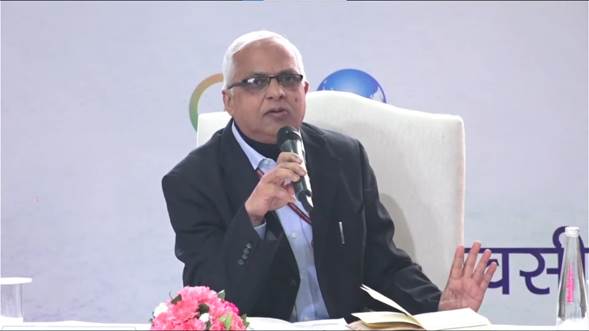
Shri Sunil Kumar called upon elected representatives and functionaries of District Panchayats and Block Panchayats to formulate proper, viable and well-thought-out plans for optimum utilization of the resources and budget available with Panchayats in the larger public interest.
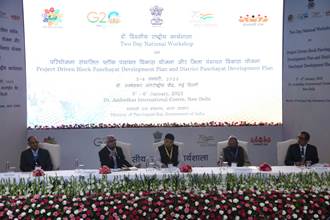
Presentation on analysis of BPDP and DPDP was made by Shri Alok Prem Nagar, Joint Secretary, Ministry of Panchayat Raj. He emphasized that development activities should be projectized at Block Panchayats and District Panchayats level through Panchayat Development Plans and it should be implemented with proper convergence of resources and active involvement of all stakeholders in order to ensure holistic and sustainable development in rural areas across the country.
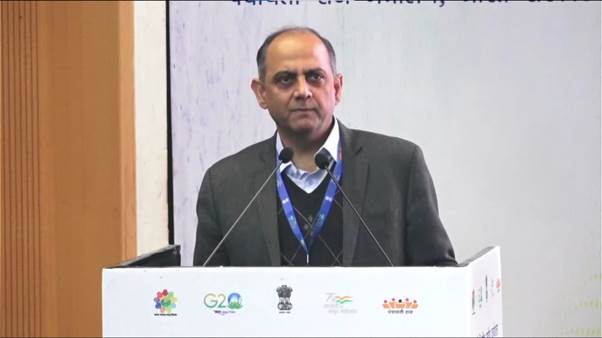
Dr. S. M. Vijayanand, Former Secretary, Ministry of Panchayati Raj said that District Panchayats and Block Panchayats should endeavour to plan meticulously to utilize Fifteenth Finance Commission Grants properly from development point of view.
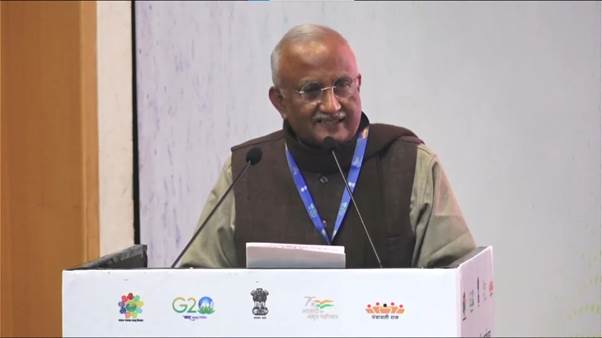
Dr. Bala Prasad, Former Special Secretary, Ministry of Panchayati Raj & Chairman of the Committee on Formulation and Implementation of BPDP and DPDP, made presentation on Draft Report on Project Driven BPDP and DPDP highlighting the following issues: (i) Localisation of Sustainable Development Goals (SDGs) in Panchayat Planning, (ii) Process of BPDP and DPDP, (iii) Project Driven BPDP and DPDP and examples of Projects to be Undertaken by Intermediate Panchayats and District Panchayats under Nine Themes and (iv) Capacity Building Framework on Project Driven BPDP and DPDP.
Dr. Bijaya Kumar Behera, Economic Advisor, Ministry of Panchayati Raj highlighted the importance of Mission LiFE implemented by the Government of India. Dr. Behera also chaired a technical session which covered presentation by States on status of formation of BPDP/ DPDP, Success stories, comments/ suggestions on the Draft Report of the Expert Committee on BPDP/DPDP.
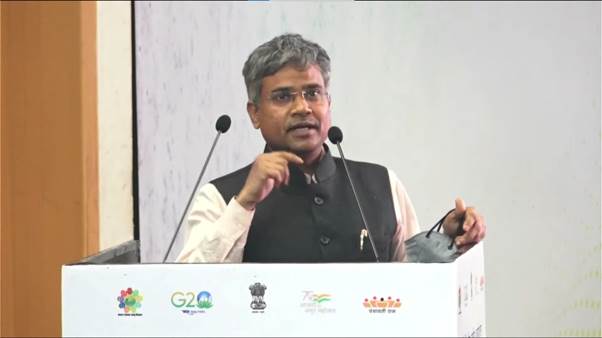
Live streaming of the National Workshop has been made available across MoPR’s official social media platforms such as Twitter, Facebook and YouTube. A large number of Panchayat representatives and functionaries joined the National Workshop in virtual mode.
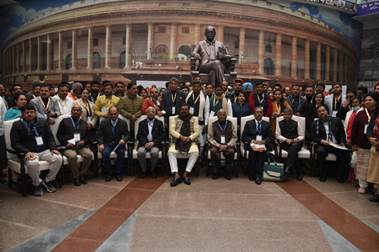
Background:
Article 243G of the Constitution of India mandates Panchayats to prepare and implement plan for economic development and social justice by converging and integrating all such schemes of Central and State Governments within their geographical area as may be entrusted to them including those in relation to the matters listed in the Eleventh Schedule of the Constitution. Accordingly, the Gram Panchayats, Intermediate Panchayats, and District Panchayats are formulating Gram Panchayat Development Plan (GPDP), Block Panchayat Development Plan (BPDP) and District Panchayat Development Plan (DPDP) respectively for their area.
Ministry of Panchayati Raj and Ministry of Rural Development, Government of India have been jointly launching People’s Plan Campaign (PPC) in 2018, 2019, 2020, 2021 and 2022 for preparing comprehensive GPDPs under the theme “Sabki Yojana, Sabka Vikas” (meaning Plans of Everybody and Development of Everybody). Since 2020 Block Panchayat Development Plan (BPDP) and District Panchayat Development Plan (DPDP) are also being prepared under the People’s Plan Campaign. The Campaign also strengthened the role of 31 lakh Elected Representatives of Panchayats and 5.25 crore women SHGs under DAY-NRLM. Mission Antyodaya data helps in identifying gaps at the village and Gram Panchayat level and facilitate systematic thrust on evidence-based planning and implementation for the GPDP.
The campaign initiated under the theme “Sabki Yojana, Sabka Vikas” was an intensive and structured exercise for planning at the Gram Panchayat level through convergence between Panchayati Raj Institutions (PRIs). The PPCs have been developed over the years and they are more broadbased, encompassing many new contemporary issues, which have been integrated into the plans of PRIs particularly, national commitments, issues and problems related to rural areas. PPC 2022 has been launched from 2nd October, 2022 to 31st March, 2023 for preparing comprehensive GPDP, BPDP and DPDP for the next financial year 2023–24. The main objectives of the PPC 2022 are as follows:
(i) Preparation of participatory, comprehensive, and convergent GPDP, BPDP and DPDP by Gram Panchayats, Intermediate Panchayats and District Panchayats respectively in a time bound manner across the country.
(ii) Evidence Based Assessment of Progress made during previous years and consideration of proposals for 2023-24 in all 29 subjects of Eleventh Schedule of Constitution and covering 9 themes of Localization of Sustainable Development Goals (LSDGs) for respective Panchayats.
(iii) Gram Sabha meetings should be preceded by meetings of ‘Bal Sabha’ and ‘Mahila Sabha’ apart from ‘Ward Sabha’ – these would facilitate enumeration and articulation of demands of children and women in addition to community at large.
(iv) Achieving effective Localization of SDGs through seamless integration of 9 thematic approaches of LSDGs into GPDP.
(v) Effective integration of Village Poverty Reduction Plans (VPRPs) into GPDP.
(vi) Promoting Gender Responsive Governance at the rural areas through effective involvement of Elected Women Representatives (EWRs), Self-Help Groups (SHGs) and women members in the community in the planning process.
(vii) Undertake Public Information Campaign with public disclosure on Schemes, Finances, etc. of all schemes & programmes in respective Panchayat Office and on Public Information Board.
Ministry of Panchayati Raj, Government of India has constituted a Committee on formulation and implementation of Project-driven Block Panchayat Development Plan (BPDP) and District Panchayat Development Plan (DPDP) under Chairpersonship of Dr. Bala Prasad, Former Special Secretary, Ministry of Panchayati Raj vide Office Memorandum dated 9th November, 2022. The terms of reference of the Committee are as follows:
(i) To layout guidelines/ advisories for the State, District Panchayat, Intermediate/ Block Panchayat to prepare project based BPDP and DPDP.
(ii) The project should be preferably (a) Broad based (b) Income Generating (c) sustainable (d) Should be of nature that Gram Panchayat could not execute of its own.
(iii) To prepare a format for preparation of project based BPDP & DPDP based on the thematic framework of localization of Sustainable Development Goals (LSDGs).
(iv) Preparation of illustrative list of activities/projects of BPDP & DPDP aligned with LSDGs.
(v) Any other matter of importance related to BPDP and DPDP.
Comments/ suggestions on the Draft Report of the Expert Committee on BPDP/DPDP have been invited from the participants of the National Workshop on Project Driven Block Panchayat Development Plan (BPDP) and District Panchayat Development Plan (DPDP) for discussion during 5 – 6 January, 2023.





